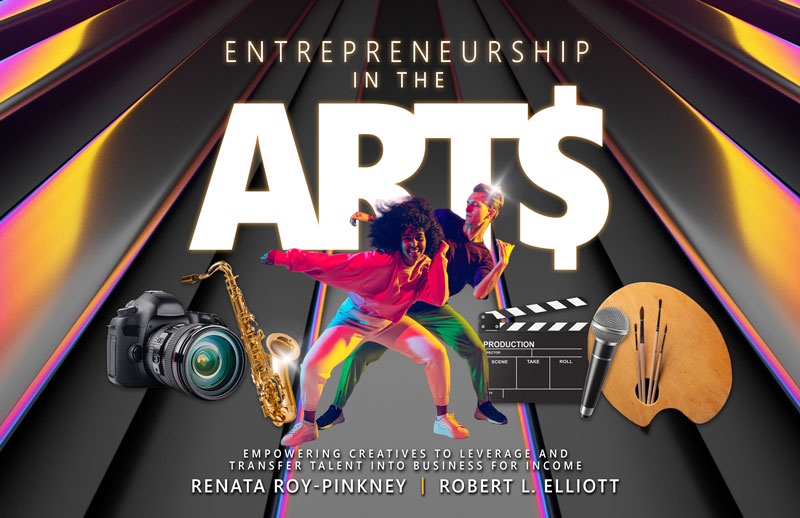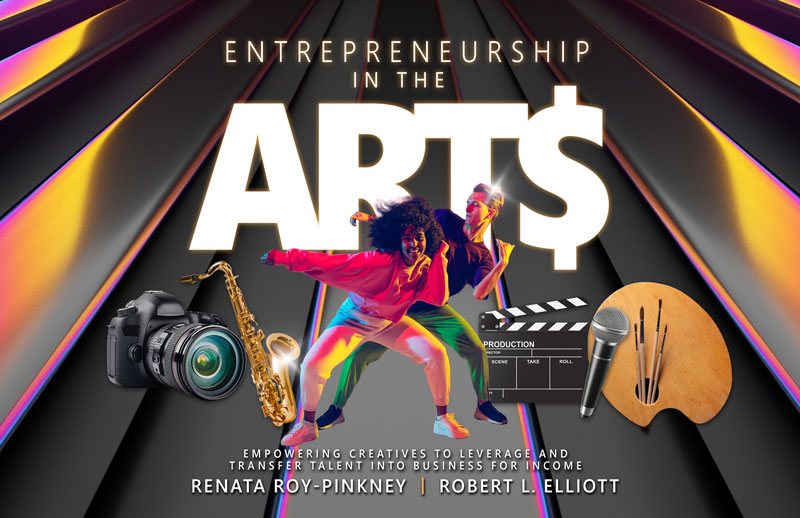Arts and Creatives Entrepreneurship: Using Passion and Skills to Create a Business with Income: Musicians, Vocalists, Artists and Communications
Author(s): RENATA ROY , Robert Elliott
Edition: 1
Copyright: 2023
Professor Renata Roy-Pinkney in her new textbook, Entrepreneurship in the Arts, has provided faculty an insight into her successful classroom integration of curriculum theory, the process of teaching a body of knowledge required for students to understand the what and why of concepts, along with that body of ‘must cover‘ information. She layers the theory with practical applications on ‘how to’ in the form of an assignment to actualize the lessons learned. The students, working in teams, are given the task of creating, staffing, funding, managing, and marketing a business related to, or in support of, some facet of the arts. They must apply the strategic processes required to maintain a successful business and remain a prosperous entrepreneur. Entrepreneurship in the Arts is designed for individual faculty to use the chapters as modules, modifying each as needed for their classes.
Professor Roy-Pinkney has a sound foundation on which to build her curriculum model for both the Entrepreneurship in the Arts classes and now her companion textbook. Her curriculum was refined over the many semesters she used it for her own classes. Professor Roy-Pinkney also had diverse career experiences: she was a public school teacher and for many years, she was an award-winning Xerox corporate sales and marketing executive. She has used her academic model as a guide for operating her successful personal businesses and entrepreneurial endeavors. The “105 Voices of History HBCU Concert Choir”, founded by Mrs. Roy-Pinkney, is a non-traditional business model and an acclaimed performing arts accomplishment.
The process of preparing students to become future leaders capable of expanding the boundaries of their educational experiences and expertise is, without a doubt, the underlying motivation for those faculty who create non-traditional teaching/learning models. The ancient Greek philosopher Aristotle wrote, “Those who know, do. Those that understand, teach.” Professor Renata Roy-Pinkney, in her pursuit of excellence in teaching entrepreneurship in the arts, created a curriculum that updates Aristotle’s thoughts by engaging her students in both the academic, theoretical understanding of the ‘whys’, and the advantages of incorporating the ‘how to’, therefore building a successful academic program on the strengths of both philosophical thoughts.
I am pleased to recommend Professor Renata Roy-Pinkney, and her new ‘roadmap’ textbook, to faculty who will shape the future journey of students interested in studying entrepreneurship in the arts!
Mabel Poe Phifer, Ph.D.
Chairperson and CEO,
Center for Leadership, Development and Research, Inc.
Durham, North Carolina
Dr. Robert L. Elliott serves as Head of the Department of Music at Tennessee State University. He holds the Bachelor of Arts in Instrumental Music Education from the University of New Orleans, the Master of Music Education from Loyola University-New Orleans, and the Doctor of Musical Arts from the University of Memphis. His studies also include work at Northern Kentucky University, the University of Central Arkansas, and Duquesne University. He was a school music teacher in and around New Orleans and has also taught at the University of Arkansas at Pine Bluff and the University of Memphis. Dr. Elliott has been an author with Kendall Hunt since 2009. Prior to joining Kendall Hunt, he was an author with McGraw Hill for 10 years were he wrote the technology part for three edition of the Kamien publication. Dr. Elliott frequently serves as a consultant for other universities in the areas of music technology and music education, writes nationally distributed technology-based instructional materials in music, and is the author of the music appreciation course textbook, Our World, Our Music. Dr. Elliott continues his career as an upright and electric bassist.
Professor Renata Roy-Pinkney in her new textbook, Entrepreneurship in the Arts, has provided faculty an insight into her successful classroom integration of curriculum theory, the process of teaching a body of knowledge required for students to understand the what and why of concepts, along with that body of ‘must cover‘ information. She layers the theory with practical applications on ‘how to’ in the form of an assignment to actualize the lessons learned. The students, working in teams, are given the task of creating, staffing, funding, managing, and marketing a business related to, or in support of, some facet of the arts. They must apply the strategic processes required to maintain a successful business and remain a prosperous entrepreneur. Entrepreneurship in the Arts is designed for individual faculty to use the chapters as modules, modifying each as needed for their classes.
Professor Roy-Pinkney has a sound foundation on which to build her curriculum model for both the Entrepreneurship in the Arts classes and now her companion textbook. Her curriculum was refined over the many semesters she used it for her own classes. Professor Roy-Pinkney also had diverse career experiences: she was a public school teacher and for many years, she was an award-winning Xerox corporate sales and marketing executive. She has used her academic model as a guide for operating her successful personal businesses and entrepreneurial endeavors. The “105 Voices of History HBCU Concert Choir”, founded by Mrs. Roy-Pinkney, is a non-traditional business model and an acclaimed performing arts accomplishment.
The process of preparing students to become future leaders capable of expanding the boundaries of their educational experiences and expertise is, without a doubt, the underlying motivation for those faculty who create non-traditional teaching/learning models. The ancient Greek philosopher Aristotle wrote, “Those who know, do. Those that understand, teach.” Professor Renata Roy-Pinkney, in her pursuit of excellence in teaching entrepreneurship in the arts, created a curriculum that updates Aristotle’s thoughts by engaging her students in both the academic, theoretical understanding of the ‘whys’, and the advantages of incorporating the ‘how to’, therefore building a successful academic program on the strengths of both philosophical thoughts.
I am pleased to recommend Professor Renata Roy-Pinkney, and her new ‘roadmap’ textbook, to faculty who will shape the future journey of students interested in studying entrepreneurship in the arts!
Mabel Poe Phifer, Ph.D.
Chairperson and CEO,
Center for Leadership, Development and Research, Inc.
Durham, North Carolina
Dr. Robert L. Elliott serves as Head of the Department of Music at Tennessee State University. He holds the Bachelor of Arts in Instrumental Music Education from the University of New Orleans, the Master of Music Education from Loyola University-New Orleans, and the Doctor of Musical Arts from the University of Memphis. His studies also include work at Northern Kentucky University, the University of Central Arkansas, and Duquesne University. He was a school music teacher in and around New Orleans and has also taught at the University of Arkansas at Pine Bluff and the University of Memphis. Dr. Elliott has been an author with Kendall Hunt since 2009. Prior to joining Kendall Hunt, he was an author with McGraw Hill for 10 years were he wrote the technology part for three edition of the Kamien publication. Dr. Elliott frequently serves as a consultant for other universities in the areas of music technology and music education, writes nationally distributed technology-based instructional materials in music, and is the author of the music appreciation course textbook, Our World, Our Music. Dr. Elliott continues his career as an upright and electric bassist.

